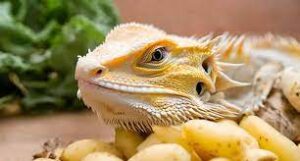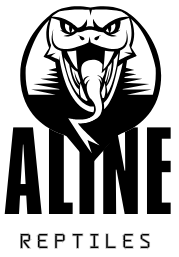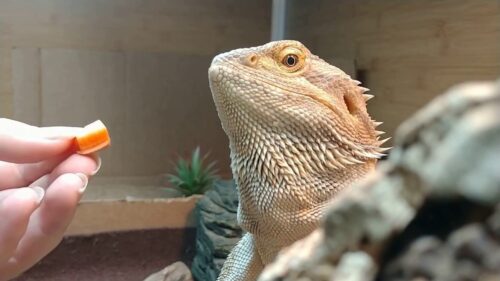As a bearded dragon owner, you’ve probably wondered whether it’s safe to share your food with your pet, especially foods that are common in your kitchen, like potatoes. Potatoes are a staple in many diets, but when it comes to feeding our reptiles, not all foods are created equal. You may be asking, “Can bearded dragons eat potatoes?”
It’s a valid question that many pet owners have, and it’s one that needs a careful answer. Potatoes might seem like a harmless treat, but they come with a few health risks for bearded dragons. In this guide, we’ll break down the facts you need to know to keep your pet safe and healthy, and give you all the information necessary to make informed choices about what you feed your scaly friend.
Understanding Bearded Dragons’ Diet

What Do Bearded Dragons Eat?
Bearded dragons, or Pogona vitticeps, are omnivores, which means their diet consists of both animal and plant-based foods. In the wild, they eat a variety of insects, fruits, vegetables, and some leafy greens. A bearded dragon’s diet is crucial for its overall health, as it influences everything from its energy levels to its longevity.
In captivity, the diet of bearded dragons is mostly made up of fresh vegetables, greens, and a variety of live insects. You may also offer small amounts of fruits occasionally, but it’s important to strike a balance between protein and plant matter to ensure they receive all the essential nutrients.
Nutritional Needs of Bearded Dragons
A well-balanced diet for bearded dragons includes a mixture of:
- Protein from insects like crickets, mealworms, and dubia roaches.
- Calcium from greens like collard greens and dandelion leaves.
- Vitamins like vitamin A, which is crucial for their skin and vision, and other minerals and nutrients from various fruits and vegetables.
While bearded dragons are omnivores, their nutritional needs differ significantly from ours, which is why it’s so important to provide them with foods that cater to their specific requirements. With that in mind, let’s explore whether potatoes fit into their diet.
Can Bearded Dragons Eat Potatoes?
Raw Potatoes: Toxicity Concerns
The first thing you should know about potatoes is that raw potatoes can be harmful, even toxic, to bearded dragons. Potatoes belong to the nightshade family, and they contain a compound called solanine, which is toxic to many animals, including reptiles.
Solanine is a naturally occurring chemical in raw potatoes (especially in the skin and sprouts) that helps protect the plant from insects and predators. When ingested, solanine can cause symptoms like lethargy, lack of appetite, digestive problems, and in severe cases, it can even be fatal.
If your bearded dragon has eaten raw potatoes, it’s essential to monitor them closely. Look for signs of poisoning, which may include:
- Vomiting
- Diarrhea
- Reduced activity or lethargy
- Trouble moving or coordinating
If you suspect solanine poisoning, contact your veterinarian immediately for advice and treatment.
Cooked Potatoes: Are They Safe?
Now, let’s discuss cooked potatoes. While cooking potatoes can break down solanine, making them less toxic, they still should not be a staple in your bearded dragon’s diet. While cooked potatoes are not as dangerous as raw ones, they still don’t provide much nutritional benefit for your pet.
If you do decide to feed cooked potatoes to your bearded dragon, make sure they’re thoroughly cooked (boiled or baked) and free from any seasoning, oil, butter, or salt. These additives can be harmful and may upset your dragon’s stomach or cause other health issues.
How Much Potatoes Is Safe?
If you choose to offer potatoes to your bearded dragon, limit the portion size. It should only be given as an occasional treat and not as a regular part of their diet. A small piece of cooked potato, about the size of their eye or smaller, is enough. Too much potato, even if cooked, can lead to an imbalance in their diet due to its high starch content, which can cause digestive issues or obesity over time.
Nutritional Breakdown of Potatoes

Key Nutrients in Potatoes
Potatoes are rich in carbohydrates, providing a good source of energy. They contain small amounts of vitamins C, B6, and potassium, which are beneficial to humans. However, when it comes to bearded dragons, potatoes fall short in providing the essential nutrients they need for optimal health.
- Carbohydrates: Potatoes are high in starch, which is essentially a complex carbohydrate. While it provides energy, bearded dragons require a much lower amount of starch than humans do, as too much can lead to obesity and digestive problems.
- Vitamin C: Though potatoes contain vitamin C, it’s not in the amounts that bearded dragons require. They obtain most of their vitamin C from fresh fruits and leafy greens.
- Potassium and Vitamin B6: While these vitamins are good for overall health, they are not as essential to bearded dragons as other nutrients like calcium and vitamin A, which are much more important for their growth and bone health.
What Nutrients Are Missing in Potatoes?
The most glaring issue with potatoes is that they lack the crucial nutrients bearded dragons need for a healthy life. Potatoes are deficient in:
- Calcium: Bearded dragons require a significant amount of calcium in their diet to promote healthy bone growth and prevent metabolic bone disease (MBD). Potatoes offer almost no calcium.
- Vitamin A: Vitamin A is vital for bearded dragons, as it supports their immune system, vision, and skin health. Potatoes do not provide this essential vitamin in adequate amounts.
So, while potatoes offer some energy in the form of carbohydrates, they lack the essential vitamins and minerals needed for a healthy bearded dragon diet.
What Happens If Bearded Dragons Eat Too Many Potatoes?
Digestive Issues
Bearded dragons have a sensitive digestive system, and too many starchy foods like potatoes can cause a variety of problems. Overconsumption of potatoes can lead to:
- Constipation: Potatoes are starchy and can slow down your bearded dragon’s digestion, leading to constipation, which can be uncomfortable and harmful.
- Diarrhea: On the flip side, if your bearded dragon’s digestive system struggles to break down the potato, it could lead to diarrhea or digestive upset.
Long-Term Health Concerns
Feeding your bearded dragon too many potatoes on a regular basis can result in more significant health problems, including obesity, malnutrition, and even organ failure in extreme cases. Potatoes don’t provide the essential vitamins, minerals, and proteins your bearded dragon needs, which could leave them nutritionally deficient over time.
Safe Alternatives to Potatoes for Bearded Dragons
Veggies and Fruits That Are Safe and Nutritious
Instead of potatoes, there are plenty of healthier, more nutritious options you can offer your bearded dragon. These foods will support their health better than potatoes ever could:
- Squash: High in vitamin A and calcium, great for digestion.
- Bell peppers: Rich in vitamin C, which helps support the immune system.
- Carrots: A great source of beta-carotene (precursor to vitamin A).
- Kale: Packed with calcium and vitamins that support bone health.
Balancing Their Diet with Protein and Vegetables
Remember that a balanced diet for your bearded dragon includes a variety of vegetables, fruits, and insects. Be sure to include a mix of leafy greens, cruciferous vegetables, and fruits like berries in their diet. Crickets, dubia roaches, and worms should also be included for protein, along with calcium-rich vegetables.
How to Introduce New Foods Safely
When introducing new foods to your bearded dragon’s diet, it’s best to do so gradually. Offer small pieces of the new food alongside their usual favorites and observe how they react. Some foods may cause digestive upset if introduced too quickly.
FAQs About Bearded Dragons and Potatoes
Can Bearded Dragons Eat Sweet Potatoes?
Yes! Unlike regular potatoes, sweet potatoes are a healthier alternative for your bearded dragon. They are rich in vitamins A and C and provide more nutritional value. However, they should still be fed in moderation, and they should be cooked without added salt or seasonings.
Can Bearded Dragons Eat Potato Chips or Fries?
No, bearded dragons should never eat processed foods like potato chips or fries. These foods are typically high in salt, fat, and oil, all of which can harm your dragon’s health. Stick to fresh, natural foods.
What to Do if My Bearded Dragon Eats Raw Potatoes?
If your bearded dragon eats raw potatoes, immediately monitor them for signs of solanine poisoning, like lethargy, drooling, or vomiting. Contact your vet as soon as possible if you notice any concerning symptoms.
Conclusion
So, can bearded dragons eat potatoes? The short answer is: Not really. While they can have a small amount of cooked potato occasionally, potatoes should not be a regular part of their diet. Their high starch content, lack of vital nutrients, and potential toxicity in raw form make them a poor food choice for bearded dragons.
Instead, provide your pet with a variety of nutritious vegetables, fruits, and high-quality proteins to ensure they remain healthy and thrive. A balanced diet will not only help your bearded dragon live a longer, happier life but will also keep them feeling their best every day.

